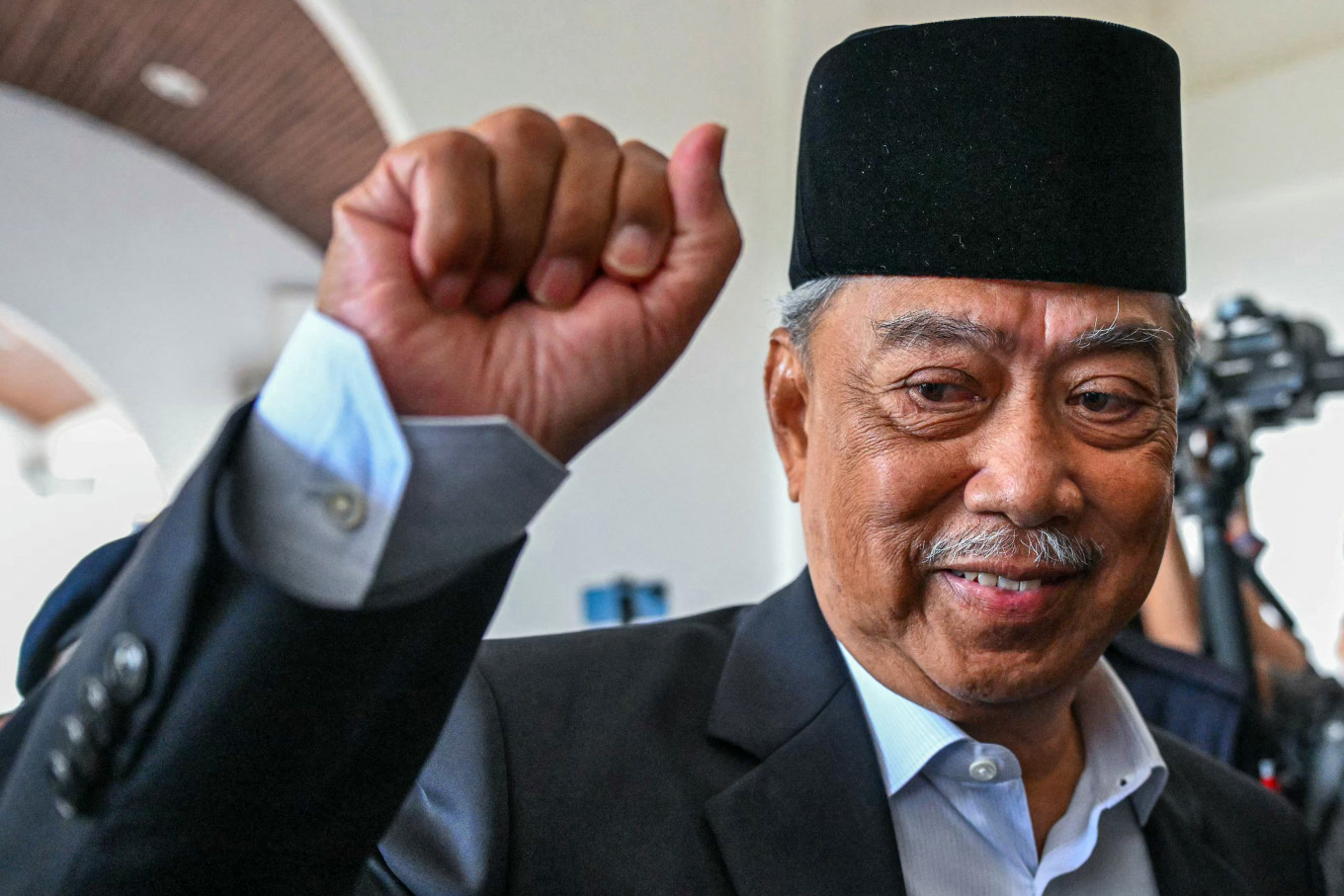Popular Reads
Top Results
Can't find what you're looking for?
View all search resultsPopular Reads
Top Results
Can't find what you're looking for?
View all search resultsMalaysia’s weakened opposition
While the coalition has been hurt by corruption charges against some of its leaders, its main obstacles are internal.
Change text size
Gift Premium Articles
to Anyone
T
wo years after Anwar Ibrahim’s government took power in Malaysia, the opposition Perikatan Nasional (PN) coalition continues to hold onto its base but has not meaningfully been able to expand it.
In fact, the PN has lost momentum over the past year, especially the Malay nationalist party Bersatu led by former prime minister Muhyiddin Yassin. Bersatu is one of three parties that comprise the PN, with the Malaysian Islamic Party (PAS) the strongest and Gerakan, included to try to expand the appeal to non-Malays, the weakest.
Several factors have curtailed the opposition over the last year. While the coalition has been hurt by corruption charges against some of its leaders, its main obstacles are internal.
The opposition’s political erosion is evident in this year’s election results.
Of the four by-elections this year, the opposition lost three. Bersatu contested all of those lost by the opposition. In one of these, Nenggiri in Kelantan state, the party lost an incumbent seat.
A closer analysis of the results shows that the PN coalition largely held onto its Malay base when facing Anwar’s coalition but lost ground when facing the beleaguered Malay nationalist party UMNO.
The erosion of support is partly due to many opposition leaders facing criminal charges.
Minimally these have been a distraction for the leaders, a long-time tactic in Malaysian politics. The charges have also spilled over into public perception, reinforcing partisan divisions.
Among them, former Prime Minister Muhyiddin had corruption and abuse of power charges dismissed in 2023, but those were reinstated this February on government appeal, and he failed to get them thrown out in September.
After comments perceived as against Malaysia’s royalty in a by-election, Muhyiddin was also charged with sedition in August. The case is ongoing.
These charges have been compounded by “divide and rule” tactics, as there have been talks aiming to convince PAS to leave the PN and join Anwar’s government. So far, these talks have failed but they have fueled disquiet among some within the opposition who understand the appeal of being in government.
Inevitably, the pressures have affected relations within the opposition.
Questions are being asked whether Muhyiddin should be the PN’s prime minister candidate. PAS openly started promoting their own in a by-election last December and this has gained traction over the year, causing tensions between PAS and Bersatu.
The tensions go beyond leadership, extending to the viability of the alliance itself.
In the relationship between PAS and Bersatu, the former has provided ground support while the latter has provided resources and served as a bridge to Malay nationalists, especially in the traditional UMNO political base.
Concerns have been raised about whether Bersatu is still fulfilling its role, especially since the party’s accounts have been frozen by the Malaysian Anti-Corruption Commission and public perceptions of Muhyiddin have shifted.
Within PAS, there is growing resistance to working with Bersatu. Party grassroots have not strongly supported Bersatu candidates in the by-elections, a factor feeding resentment.
Bersatu is also seen as holding too many leadership positions in the PN coalition leadership structure.
PAS is aiming for a more dominant role in the opposition, with some party members advocating for the group to separate from Bersatu.
The party’s focus has been on showcasing its governance role, with its event of the year being the formation of the State Government Four (SG4) company aiming to pool resources for the four state governments it controls. At the same time, the party is rethinking its political relationships.
Bersatu has been inward-focused as it wrestles with its internal struggles. The party is divided into two major factions: between deputy president Hamzah Zainuddin and former trade minister Azmin Ali.
Bersatu faced its party election this year in November where these issues were brought to the fore. There were considerable attempts to reduce tensions and accommodate the two groups. After the polls, Azmin Ali was made secretary-general of Bersatu and the PN. Others left the party over concerns about leadership issues.
Divisions within political parties are common. What is not common is the PN’s reluctance to take on the opposition role.
Rumors of opposition leaders trying to woo UMNO and other parties to form an alternative government have persisted throughout the year. This speaks to the eagerness of the opposition wanting to get back into government and access power.
As an opposition in the parliament, the PN has underperformed. They have raised issues, but have yet to offer different policies and reinforce perceptions that they can govern nationally, especially to manage the economy.
As an opposition, the PN lacks focus and a clear set of national issues. It is reactive rather than proactive in messaging.
When the Anwar government passed controversial bills impinging on free speech this past week, with a few of its own coalition members in attendance, the opposition was not even able to rally its numbers to stop the legislation.
These problems limit the opposition’s appeal, weakening the opposition.
The result is that as Anwar’s government has alienated his progressive base, the opposition’s issues have meant it has not broadened its support as well.
It is no wonder the stronger party in the PN is evaluating its ties inside the coalition. Recent developments foreshadow a reckoning among PN parties over leadership and further strains within the coalition.
For Malaysia as a whole, a weaker opposition means persistent political polarization and less traction toward the reforms the country needs.
---
The writer is an independent researcher, an honorary research associate at the Asia Research Institute of University of Nottingham Malaysia in Kuala Lumpur and a senior associate fellow of the Habibie Center. The views expressed are personal.











